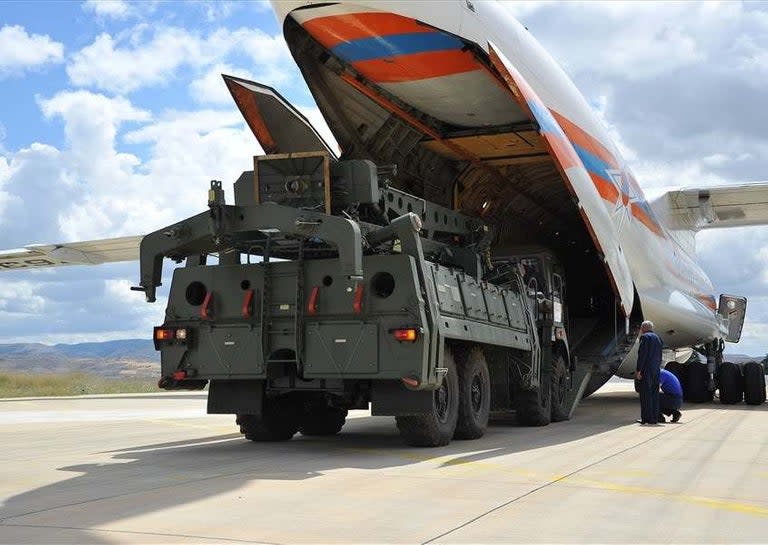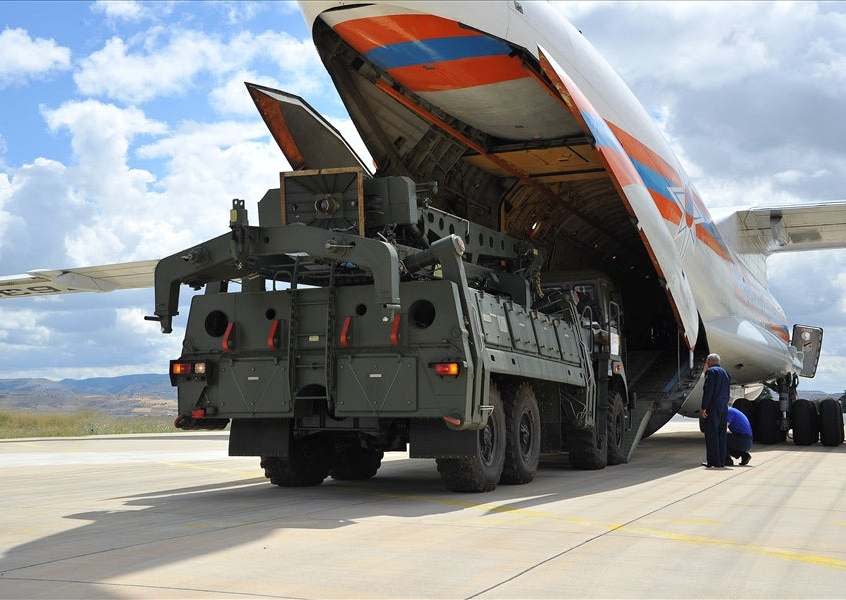Turkey and Russia’s air defence deal is a nightmare for the US – and still Trump has no idea what Putin is up to
Turkey has chosen to walk Russia’s path. In insisting to stay the course of buying the Russian S-400 air defence system, it has handed the thread tip of the west to the unshaken hands of Vladimir Putin. After all, this has been Putin’s plan from the start.
Donald Trump’s obliviousness to that motive became all the more apparent on Tuesday. Showcasing his utter delusion, he signalled reluctance to punish Turkey over its acquisition of a Russian air defence system, saying it was “not fair” that the United States would now be prohibited from selling Ankara billions of dollars worth of F-35 stealth fighter jets. And when he was pressured by his administration to take action, he didn’t go further than the exclusion of Turkey from the F-35 program.
But the only party that will be dealt an unfair and fatal blow by Trump’s unwillingness to punish Turkey is Nato.
Putin understands well Turkish president Recep Tayyip Erdogan’s deeply rooted insecurities, and he is indulging himself in a game of magic tricks to piggyback these anxieties in order to gain leverage over the west.
The last thing Erdogan wants to see again is Turkish fighter jets bombing the parliament house, or even his presidential palace, as part of another military attempt on his rule. When this happened in 2016, Turkey’s air forces didn’t have capable air defence systems, and immediately lost control. But now the possession of S-400 systems will prevent that, creating a culture of self-deterrence inside the army ranks against the full use of air force to plunge the regime.
This was Erdogan’s vision to secure his increasing inclination towards centring himself at the heart of a long-term personality cult practice which characterises his political dominion in Turkey. When the US turned its back on the growing despotic senses in Erdogan’s style, he ushered his strategically perplexed country towards Russia.
The US military support to the Kurdish YPG forces in Syria poured fuel on the fire. The YPG, which did the heavy lifting in demolishing Isis’s caliphate in Syria, was the last feature of American existence in the war-torn country that once posed an existential threat to Turkey’s security. Turkey’s absolute failure in filling the vacuum created by the US drawdown from the Middle East (especially in Syrian city of Idlib where Russia and Iran thwarted Turkey’s ambitions) left Erdogan with very few options. The easiest option was to pivot towards Russia.
Since the shooting down of a Russian bomber, which encroached on the Turkish border with Syria in 2015, Putin invested heavily in driving a wedge between Turkey and the west. He was aware of Turkey’s ambitions to build independent military capabilities from Nato by converting the Turkish military industry to a diversified weapons system with a vision of integrating it into the army. Russia offered Turkey its Su-35 fighter jet just a day after it was kicked out of the F-35 programme. Is there still any ambiguity here?
Nato’s problem is not losing control of Turkey’s complicated defence structure. It is allowing Russian experts, who will be deployed to Turkey to train Turkish soldiers on how to play with their new toys, to have unprecedented control in the air force of the second biggest military in Nato. Having Russia at the top structure of the air force of a Nato member state was the best position for Russia’s intelligence to collect sensitive data on the F-35 fighters, the backbone of the US and Nato’s future air power.
The rise of the increasing number of Putin’s extreme right-wing friends in Europe suggests that using military games to push American influence back is just the beginning. Putin is poised to bring in a new era of infiltrating and wrecking the pillars of modern Europe and what Europeans stand for.
Trump’s failure to punish Erdogan further will be a lost chance to reverse Putin’s malicious agenda to implode the EU, Nato and every entity helping to keep Russia’s ambitions in check in the post-Cold War landscape.
Turkish dollar-denominated bonds and the lira have both fallen in recent days, with investors concerned about its credibility. Imposing economic sanctions on the Turkish economy, which is deeply intertwined with the US and EU economies, will not result in pushing Turkey towards the Russian sphere. Erdogan can’t afford cutting Turkey’s throat for the Russian S-400. Turkey is more economically vulnerable and dependent on the US than ever.
If Turkey gets away with granting Russia a foothold in the heart of Nato without severe punishment, the US administration might make a few pennies, and Trump might use the whole squabble to throw some dirt on Obama for more votes in the 2020 election race, but he will be simultaneously fiddling with the glue that holds the western democratic world together.
Trump is nudging the US into the best act of self-harm of the 21st century, with Brexit second best. No wonder Putin keeps his cards close to his chest and his lips zipped. For Putin, Trump represents a chance for historical change for Russia, an opportunity that is unlikely to come again, hence his piecemeal approach and calculated risks to make it reality.
The Russians twisted Trump’s arms over the sale of S-400 to Turkey. The Iranians are sabre-rattling his “maximum pressure” strategy. The North Koreans are making him look like a buffoon. So, who’s next?

 Yahoo News
Yahoo News 

